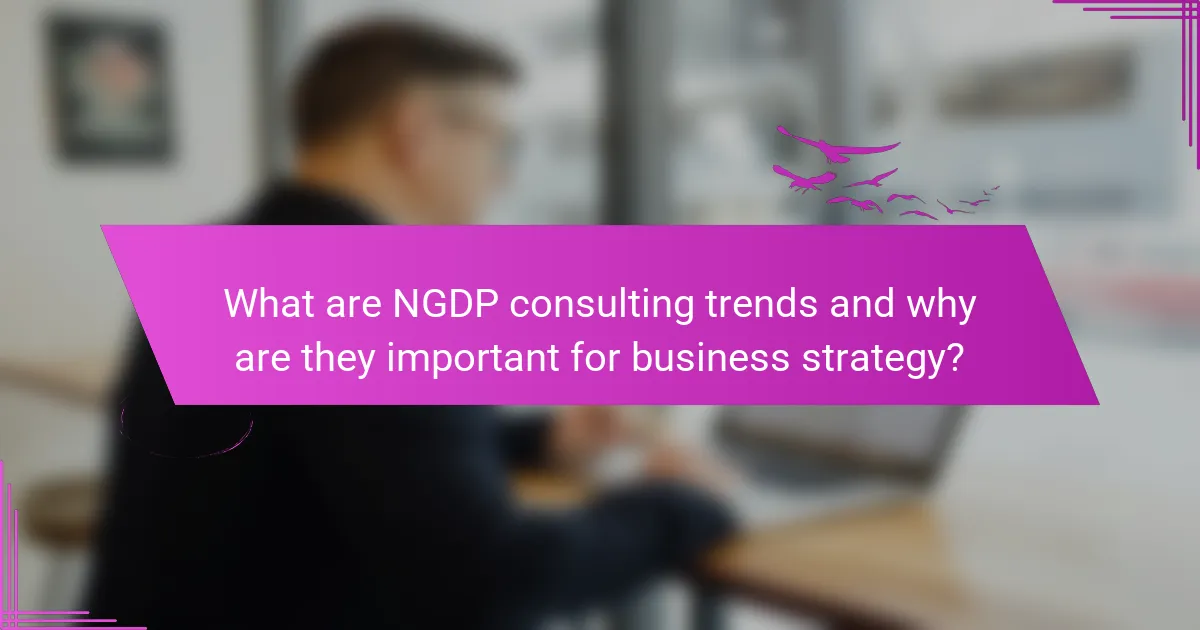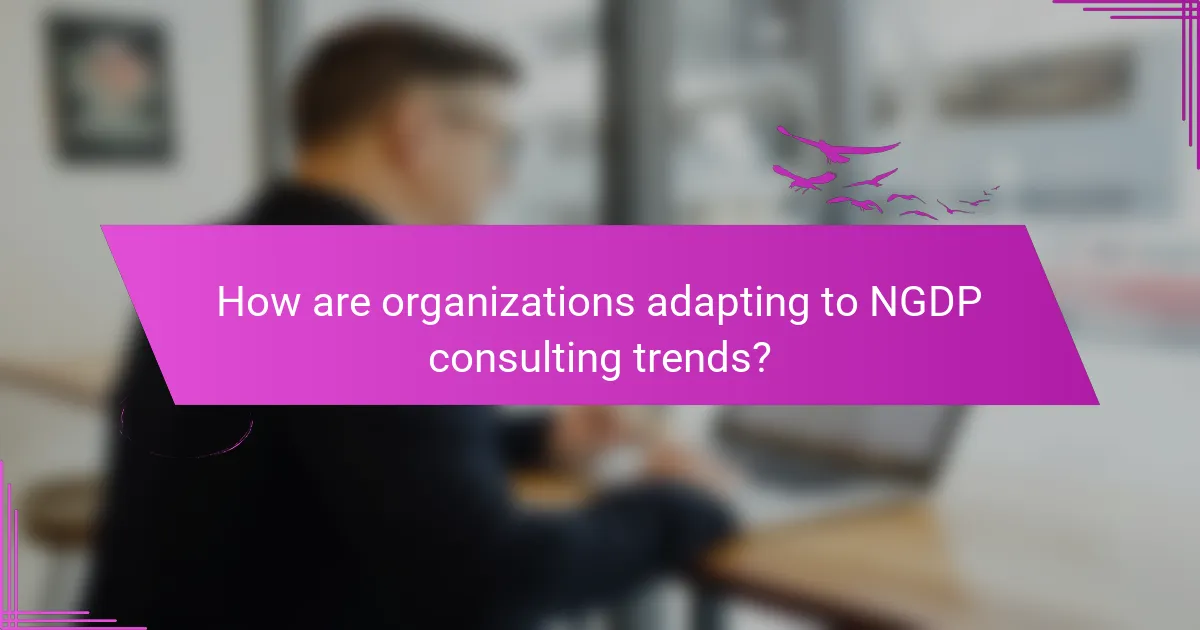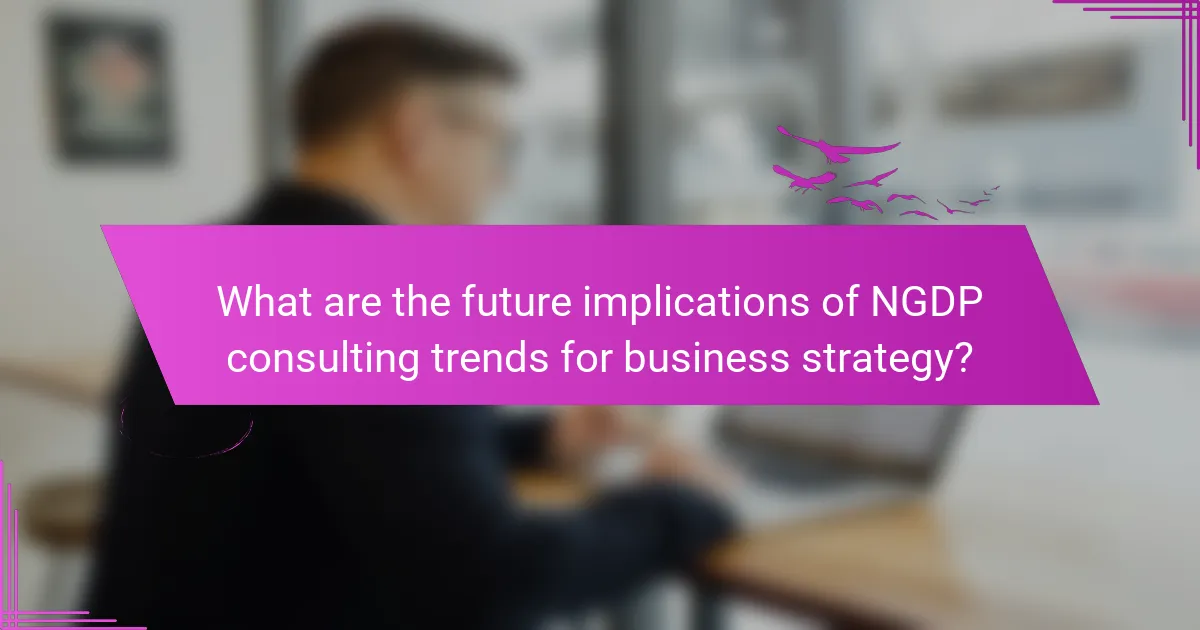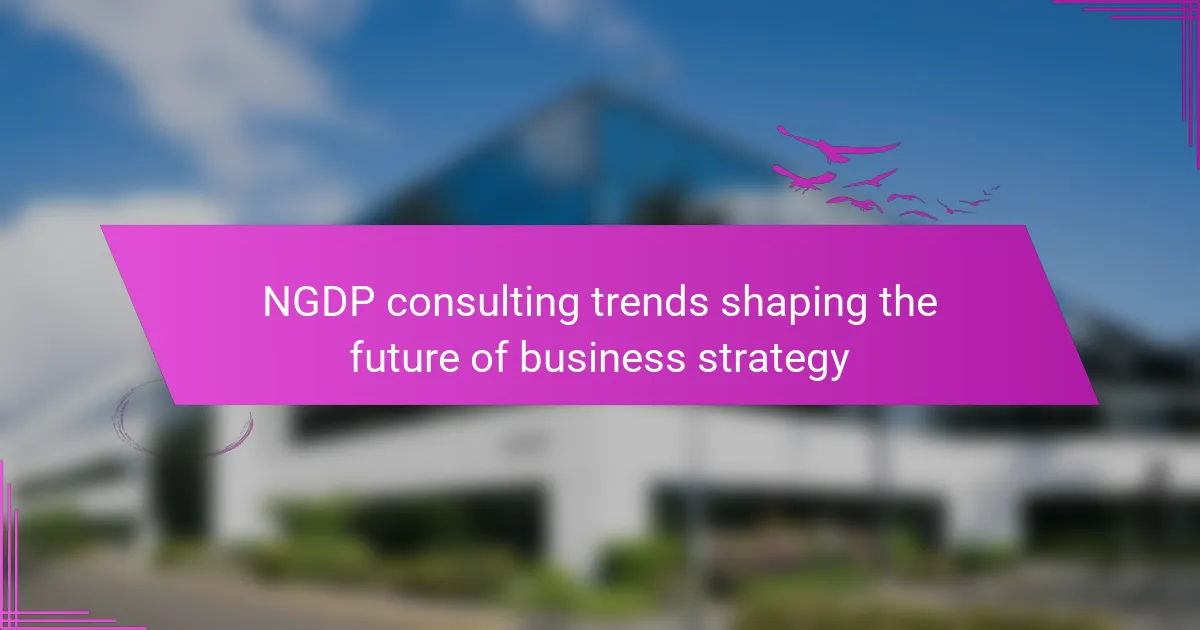
What are NGDP consulting trends and why are they important for business strategy?
NGDP consulting trends focus on adaptive strategies that enhance organizational agility and resilience. These trends include data-driven decision making, stakeholder engagement, and sustainable practices. They are important for business strategy as they enable companies to respond effectively to market changes. For instance, organizations that leverage data analytics can identify consumer patterns and optimize operations. Additionally, engaging stakeholders fosters collaboration and innovation. Sustainable practices align business goals with societal expectations, enhancing brand reputation. Collectively, these trends facilitate long-term success and competitive advantage in a dynamic business environment.
How do NGDP consulting trends influence decision-making in organizations?
NGDP consulting trends significantly influence decision-making in organizations by providing data-driven insights. These trends emphasize the importance of adapting to economic changes. Organizations leverage NGDP data to forecast market conditions and tailor strategies accordingly. This approach enhances agility and responsiveness in decision-making processes. For instance, companies that utilize NGDP metrics can better allocate resources to high-growth areas. Additionally, NGDP consulting encourages collaboration across departments. This leads to more informed and cohesive strategic planning. Ultimately, organizations that embrace these trends are better positioned to navigate uncertainties and seize opportunities.
What specific trends are emerging in NGDP consulting?
Emerging trends in NGDP consulting include a focus on data-driven decision-making and sustainability. Consultants are increasingly utilizing advanced analytics to provide insights into economic trends and consumer behavior. This shift enhances strategic planning and operational efficiency. Additionally, there is a growing emphasis on integrating sustainable practices into business models. Companies are prioritizing environmental, social, and governance (ESG) factors in their strategies. This trend reflects a broader societal demand for corporate responsibility. Furthermore, collaboration between consultants and technology firms is becoming more prevalent. This partnership aims to leverage innovative tools for improved forecasting and risk management. These trends indicate a transformation in how businesses approach growth and resilience in a changing economic landscape.
How do these trends vary across different industries?
Trends in NGDP consulting vary significantly across different industries. In technology, there is a strong emphasis on digital transformation and automation. Companies prioritize adopting new software solutions and streamlining operations. In healthcare, trends focus on patient-centered care and telemedicine. This shift aims to enhance accessibility and improve patient outcomes. The financial services industry emphasizes regulatory compliance and risk management. Firms invest in advanced analytics to mitigate risks and ensure adherence to regulations. Retail trends highlight personalized marketing and e-commerce solutions. Businesses adapt to consumer preferences through data-driven insights. Manufacturing trends lean towards sustainability and smart manufacturing. Companies aim to reduce waste and enhance efficiency through innovative practices. Each industry tailors NGDP consulting trends to address specific challenges and opportunities.
What role does technology play in shaping NGDP consulting trends?
Technology is crucial in shaping NGDP consulting trends. It enhances data analysis capabilities, enabling consultants to derive insights from large datasets. Advanced analytics tools allow for real-time decision-making. Automation streamlines consulting processes, reducing time and costs. Cloud computing facilitates collaboration among teams across different locations. Artificial intelligence provides predictive modeling, improving strategic recommendations. Additionally, technology fosters innovation by enabling the development of new consulting methodologies. According to a report by McKinsey, firms that leverage technology in consulting see a 30% increase in efficiency.
How is data analytics transforming NGDP consulting practices?
Data analytics is transforming NGDP consulting practices by enhancing decision-making and strategy formulation. It enables consultants to analyze vast amounts of data quickly and accurately. This leads to more informed recommendations for clients. Data-driven insights help identify market trends and customer preferences. As a result, NGDP consultants can tailor strategies to meet specific client needs. The integration of predictive analytics also allows for forecasting future outcomes. This capability improves risk management and resource allocation. Ultimately, data analytics increases the overall effectiveness of NGDP consulting services.
What technologies are driving change in business strategy development?
Artificial intelligence, big data analytics, and cloud computing are driving change in business strategy development. Artificial intelligence enables data-driven decision-making and predictive analytics. Big data analytics provides insights from vast amounts of data, enhancing strategic planning. Cloud computing offers scalable resources, allowing businesses to adapt quickly to market changes. According to a McKinsey report, companies using AI can improve their profitability by 5-10%. This shows the significant impact of these technologies on business strategy.

How are organizations adapting to NGDP consulting trends?
Organizations are adapting to NGDP consulting trends by embracing digital transformation and data-driven decision-making. They are investing in technology to enhance operational efficiency. Many organizations are also focusing on agile methodologies to respond quickly to market changes. Furthermore, they are prioritizing sustainability and social responsibility in their strategies. Collaboration with external consultants is increasing to gain specialized insights. Training programs are being developed to upskill employees in line with new consulting practices. Research shows that companies implementing these trends report improved performance and competitiveness. These adaptations are essential for staying relevant in a rapidly evolving business landscape.
What strategies are businesses implementing to align with NGDP trends?
Businesses are implementing various strategies to align with NGDP trends. They are focusing on data-driven decision-making to enhance efficiency. Companies are investing in technology to automate processes and improve productivity. Many are adopting agile methodologies to respond quickly to market changes. Sustainability practices are being integrated into core operations to meet consumer expectations. Additionally, businesses are fostering a culture of innovation to stay competitive. Research indicates that organizations prioritizing these strategies see improved performance metrics. According to a McKinsey report, companies that embrace digital transformation achieve 20-30% higher revenue growth.
How do organizations measure the effectiveness of these strategies?
Organizations measure the effectiveness of strategies through various performance metrics. They often utilize key performance indicators (KPIs) to assess progress. Common KPIs include revenue growth, customer satisfaction scores, and market share. Surveys and feedback mechanisms also provide insights into stakeholder perceptions. Additionally, organizations may conduct regular performance reviews and audits. Data analytics tools help track trends and outcomes over time. Benchmarking against industry standards offers a comparative perspective. These methods collectively enable organizations to evaluate the impact of their strategies effectively.
What challenges do businesses face when adapting to NGDP consulting trends?
Businesses face several challenges when adapting to NGDP consulting trends. One significant challenge is the rapid pace of change in consulting methodologies. This requires businesses to continuously update their strategies and processes. Another challenge is the need for skilled personnel who understand NGDP principles. Many organizations struggle to find or train employees with the necessary expertise. Resistance to change within the organization can also hinder adaptation. Employees may be accustomed to traditional methods and reluctant to embrace new approaches. Additionally, integrating technology into existing frameworks poses difficulties. Businesses often face technical issues or lack the infrastructure needed for successful implementation. Budget constraints can limit the ability to invest in new consulting strategies. Finally, measuring the effectiveness of NGDP trends can be complex, making it hard to justify changes. These challenges must be navigated for successful adaptation to NGDP consulting trends.
What skills are essential for consultants in the context of NGDP trends?
Essential skills for consultants in the context of NGDP trends include analytical thinking, communication, and adaptability. Analytical thinking allows consultants to interpret complex data and identify trends. Effective communication is crucial for conveying insights to clients clearly. Adaptability helps consultants respond to the rapidly changing economic landscape. Additionally, problem-solving skills enable consultants to devise strategic solutions. Industry knowledge is also vital for understanding specific market dynamics. These skills collectively empower consultants to guide businesses through NGDP-related challenges and opportunities.
How can consultants develop competencies to meet evolving business needs?
Consultants can develop competencies to meet evolving business needs by engaging in continuous learning and skill enhancement. They should participate in relevant training programs and workshops. This helps them stay updated on industry trends and technologies. Networking with other professionals also fosters knowledge exchange. Additionally, consultants should seek feedback from clients to understand their changing needs. Adopting an agile mindset enables quick adaptation to shifts in the market. Utilizing data analytics enhances decision-making capabilities. According to a report by McKinsey, firms that invest in skill development see a 20% increase in productivity. This demonstrates the effectiveness of proactive competency development.
What role does continuous learning play in the consulting profession?
Continuous learning is essential in the consulting profession. It enables consultants to stay updated with industry trends and emerging technologies. This ongoing education enhances their problem-solving skills and adaptability. Clients expect consultants to provide innovative solutions based on the latest knowledge. Continuous learning contributes to professional growth and career advancement. Research indicates that firms prioritizing learning outperform those that do not. A study by McKinsey found that companies with strong learning cultures are 46% more likely to be first to market. Therefore, continuous learning is vital for maintaining competitiveness in consulting.

What are the future implications of NGDP consulting trends for business strategy?
NGDP consulting trends will significantly influence business strategy by promoting data-driven decision-making. Businesses will increasingly rely on predictive analytics to forecast market trends. This reliance will enhance agility and responsiveness to changing consumer needs. Moreover, NGDP trends will drive the integration of technology in strategic planning. Companies will adopt advanced tools for real-time data analysis. This shift will improve operational efficiency and resource allocation. Additionally, the focus on sustainability within NGDP consulting will reshape corporate social responsibility initiatives. Organizations will prioritize sustainable practices to meet stakeholder expectations. These trends indicate a future where strategic decisions are informed by comprehensive data insights and sustainability considerations.
How will NGDP consulting trends shape the landscape of business strategy in the next decade?
NGDP consulting trends will significantly influence business strategy over the next decade. These trends emphasize data-driven decision-making and adaptability. Companies will increasingly rely on advanced analytics to inform their strategies. This shift will lead to more personalized customer experiences and targeted marketing efforts. Additionally, remote work and digital collaboration tools will reshape organizational structures. As a result, businesses will become more agile in responding to market changes. The integration of sustainability in consulting practices will also drive strategic priorities. Firms will focus on sustainable growth and social responsibility. This evolution will ultimately redefine competitive advantages in various industries.
What predictions can be made about the future of consulting based on current trends?
The future of consulting will see increased reliance on data analytics and technology. Consulting firms are adopting AI and machine learning for better insights. This trend is driven by the need for efficiency and accuracy. Remote consulting services will become more prevalent due to the pandemic’s impact. Clients prefer flexible, virtual solutions that save time and costs. Sustainability will also shape consulting, as businesses focus on eco-friendly practices. Firms that specialize in sustainability consulting are expected to grow. Finally, the demand for personalized consulting experiences will rise. Customization will be key to meeting diverse client needs.
How can businesses prepare for upcoming changes in consulting practices?
Businesses can prepare for upcoming changes in consulting practices by adopting agile methodologies. Agile practices enhance responsiveness to market dynamics. They enable teams to adjust strategies quickly based on client feedback and emerging trends. Additionally, investing in digital tools is crucial. Digital platforms facilitate remote collaboration and data analysis. This investment can improve decision-making processes.
Furthermore, businesses should prioritize continuous learning and development. Upskilling employees ensures they are equipped with the latest industry knowledge. Engaging with thought leaders and industry forums can also provide insights into evolving practices.
Finally, fostering a culture of innovation is essential. Encouraging creative problem-solving can lead to unique solutions that set a business apart. These strategies collectively position businesses to navigate shifts in consulting effectively.
What best practices should organizations follow to leverage NGDP consulting trends effectively?
Organizations should adopt a proactive approach to leverage NGDP consulting trends effectively. This includes regularly assessing industry trends and aligning them with organizational goals. Engaging with stakeholders is crucial for understanding their needs and expectations. Implementing data-driven decision-making enhances strategic planning. Collaborating with NGDP consultants can provide valuable insights into best practices. Continuous training and development of staff ensure adaptability to changing trends. Monitoring the outcomes of implemented strategies allows for timely adjustments. These practices are supported by research showing that organizations that embrace consulting trends achieve higher growth rates.
How can businesses foster a culture of innovation in response to consulting trends?
Businesses can foster a culture of innovation by encouraging collaboration and open communication. This approach allows diverse ideas to surface and be evaluated. Implementing agile methodologies can enhance responsiveness to market changes. Investing in employee training promotes skill development and creative thinking. Establishing innovation labs or incubators provides a structured environment for experimentation. Recognizing and rewarding innovative efforts motivates employees to contribute ideas. According to a 2021 McKinsey report, companies prioritizing innovation achieve 2.5 times higher revenue growth. These strategies collectively create an ecosystem where innovation thrives in response to consulting trends.
What are the common pitfalls to avoid when implementing NGDP consulting strategies?
Common pitfalls to avoid when implementing NGDP consulting strategies include inadequate stakeholder engagement. This can lead to misalignment between the consulting team and the organization’s goals. Another pitfall is neglecting to measure progress effectively. Without clear metrics, it becomes difficult to assess the impact of the strategies. Failing to adapt to changing market conditions is also critical. Strategies must remain flexible to respond to new challenges and opportunities. Additionally, overlooking the importance of clear communication can create misunderstandings. Effective communication ensures that all parties are informed and aligned. Lastly, not providing adequate training and support can hinder the implementation process. Employees need the right tools and knowledge to execute new strategies successfully.
NGDP consulting trends are adaptive strategies that enhance organizational agility and resilience, focusing on data-driven decision-making, stakeholder engagement, and sustainable practices. This article explores how these trends influence business strategy, decision-making processes, and industry-specific implementations. It highlights the role of technology and data analytics in transforming consulting practices and examines the challenges organizations face while adapting to these trends. Furthermore, it discusses essential skills for consultants, the importance of continuous learning, and best practices for leveraging NGDP trends effectively to foster innovation and improve performance.
